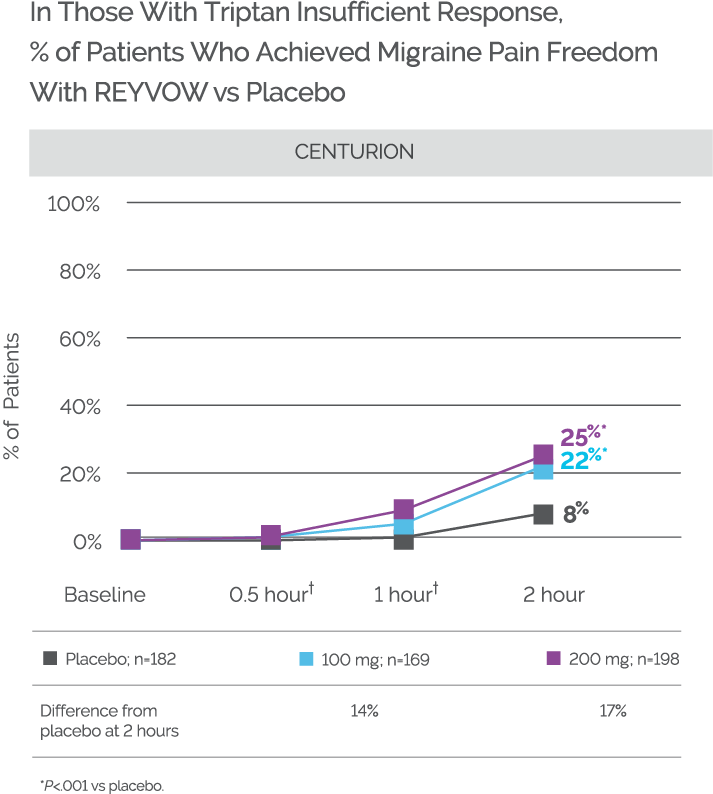IMPORTANT SAFETY INFORMATION
WARNINGS AND PRECAUTIONS
Driving Impairment - REYVOW may cause significant driving impairment. In a driving study, administration of single 50 mg, 100 mg, or 200 mg doses of REYVOW significantly impaired subjects’ ability to drive. Additionally, more sleepiness was reported at 8 hours following a single dose of REYVOW compared to placebo. Advise patients not to engage in potentially hazardous activities requiring complete mental alertness, such as driving a motor vehicle or operating machinery, for at least 8 hours after each dose of REYVOW. Patients who cannot follow this advice should not take REYVOW. Prescribers and patients should be aware that patients may not be able to assess their own driving competence and the degree of impairment caused by REYVOW.
Central Nervous System Depression - REYVOW may cause central nervous system (CNS) depression, including dizziness and sedation. Because of the potential for REYVOW to cause sedation, other cognitive and/or neuropsychiatric adverse reactions, and driving impairment, REYVOW should be used with caution if used in combination with alcohol or other CNS depressants. Patients should be warned against driving and other activities requiring complete mental alertness for at least 8 hours after REYVOW is taken.
Serotonin Syndrome - In clinical trials, reactions consistent with serotonin syndrome were reported in patients treated with REYVOW who were not taking any other drugs associated with serotonin syndrome. Serotonin syndrome may also occur with REYVOW during coadministration with serotonergic drugs e.g., selective serotonin reuptake inhibitors (SSRIs), serotonin norepinephrine reuptake inhibitors (SNRIs), tricyclic antidepressants (TCAs), and monoamine oxidase (MAO) inhibitors. Serotonin syndrome symptoms may include mental status changes (e.g., agitation, hallucinations, coma), autonomic instability (e.g., tachycardia, labile blood pressure, hyperthermia), neuromuscular signs (e.g., hyperreflexia, incoordination), and/or gastrointestinal signs and symptoms (e.g., nausea, vomiting, diarrhea). The onset of symptoms usually occurs within minutes to hours of receiving a new or a greater dose of a serotonergic medication. Discontinue REYVOW if serotonin syndrome is suspected.
Medication Overuse Headache - Overuse of acute migraine drugs (e.g., ergotamines, triptans, opioids, or a combination of drugs for 10 or more days per month) may lead to exacerbation of headache (i.e., medication overuse headache). Medication overuse headache may present as migraine-like daily headaches or as a marked increase in frequency of migraine attacks. Detoxification of patients including withdrawal of the overused drugs and treatment of withdrawal symptoms (which often includes a transient worsening of headache) may be necessary.
ADVERSE REACTIONS
The most common adverse reactions associated with REYVOW (≥2% and greater than placebo in clinical studies) were dizziness, fatigue, paresthesia, sedation, nausea and/or vomiting, and muscle weakness.
ABUSE
REYVOW contains lasmiditan, a Schedule V controlled substance (C-V).
REYVOW has abuse potential. Evaluate patients for risk of drug abuse and observe them for signs of lasmiditan misuse or abuse.
See
Prescribing Information
and
Medication Guide.
LM HCP ISI 28SEP2020





